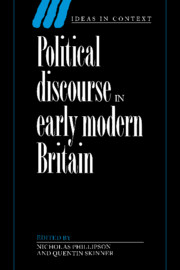Book contents
- Frontmatter
- Contents
- Contributors
- Preface
- PART I
- PART II
- PART III
- PART IV
- 13 Shaftesbury, politeness and the politics of religion
- 14 Propriety, property and prudence: David Hume and the defence of the Revolution
- 15 The rhapsody of public debt: David Hume and voluntary state bankruptcy
- 16 Universal monarchy and the liberties of Europe: David Hume's critique of an English Whig doctrine
- PART V
- A bibliography of the writings of J. G. A. POCOCK
- Index
- Ideas in Context
16 - Universal monarchy and the liberties of Europe: David Hume's critique of an English Whig doctrine
Published online by Cambridge University Press: 07 May 2010
- Frontmatter
- Contents
- Contributors
- Preface
- PART I
- PART II
- PART III
- PART IV
- 13 Shaftesbury, politeness and the politics of religion
- 14 Propriety, property and prudence: David Hume and the defence of the Revolution
- 15 The rhapsody of public debt: David Hume and voluntary state bankruptcy
- 16 Universal monarchy and the liberties of Europe: David Hume's critique of an English Whig doctrine
- PART V
- A bibliography of the writings of J. G. A. POCOCK
- Index
- Ideas in Context
Summary
The Scottish Enlightenment presented English Whiggism with an unusual challenge. From a standpoint at once within and outwith the English political world, the Scots set themselves to rid English Whig politics and history of its parochial prejudices and ancient constitutional myths, and to interpret them afresh in a properly cosmopolitan perspective. Unsurprisingly, it was a challenge resented by most of its intended beneficiaries; and it is only recently that historians of English political thought have come to appreciate its significance. If the point is now generally taken, few have been as generous and imaginative in their pursuit of it as John Pocock.
In pressing that challenge, no Scot was more tenacious or resourceful than David Hume. In Duncan Forbes's seminal phrase, Hume counterposed the cosmopolitan standards of ‘sceptical Whiggism’ to the parochial shibboleths of English ‘vulgar Whiggism’. But simply to insist upon Hume's scepticism, Pocock has argued, may be to underestimate the degree of ambivalence and even, in the end, of frustration expressed in Hume's political thinking. While it is almost certainly mistaken to interpret Hume's vigorous private hostility to Wilkes as evidence of a late conversion to Toryism, what Pocock characterised as ‘the dying thoughts of a North Briton’ seem to express an unease which goes beyond the sceptical. In this essay, I wish to reinforce the impression of serious Humean disenchantment with English Whiggism, by examining a hitherto almost unrecognised line of reflection within his political thought, that devoted to Britain's place in Europe.
- Type
- Chapter
- Information
- Political Discourse in Early Modern Britain , pp. 349 - 374Publisher: Cambridge University PressPrint publication year: 1993
- 11
- Cited by

